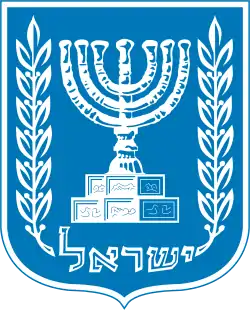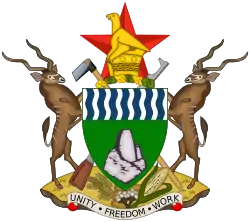Israel–Zimbabwe relations
Israel–Zimbabwe relations refers to foreign relations between Israel and Zimbabwe. Neither country has a resident ambassador.
 | |
Israel |
Rhodesia |
|---|---|
 | |
Israel |
Zimbabwe |
|---|---|
History
Israel did not originally support Rhodesia's 1965 declaration of independence from the United Kingdom.[1] Later in the same year, it called the new Rhodesian regime illegal.[2]
However, by the 1970s Israel's attitude toward Rhodesia changed. Rhodesia was largely under international sanctions due to its Timocratic nature. Israel, like Portugal and others,[3] did not participate in the sanctions.[4] During the 1970s, Israel sold weapons and military equipment to the white government of Rhodesia during the Rhodesian Bush War, eventually granting them a license to manufacture their own.[5]
Rhodesia became Zimbabwe Rhodesia in 1979, then Zimbabwe in 1980. The new Zimbabwean government under Robert Mugabe supported the PLO under Yasser Arafat during the 1980s, and formally established relations with the PLO in March 1983. Israeli relations with South Africa in the 1970s led to Zimbabwe's verbal support for the PLO and comparisons of Zionism to apartheid.[6] The state-run publication, The Herald, questioned the legitimacy of Israel's existence. In October 1983, Abel Muzorewa, the former Prime Minister of Zimbabwe Rhodesia, visited Israel. He urged Robert Mugabe to establish diplomatic relations, saying his political policies hurt Zimbabwe's agriculture and technology industries. Muzorewa was imprisoned that year for alleged conspiracy with Israel and South Africa.[7]
Israel and Zimbabwe established formal diplomatic relations in 1993.[8] In 2001, the Zimbabwean government voiced support for a two-state solution to the Israeli–Palestinian conflict.[6]
Commercial ties
Zimbabwe is not a party to boycotts on Israel.[9] In March 2002 an Israeli company sold riot control vehicles to the Mugabe government.[10] In 2008, a Zimbabwean business delegation visited Israel for a week to explore new trade opportunities in the spheres of agriculture, telecommunications, cosmetics and solar energy. The tour was organized by the Christian Friends of Israel Zimbabwe.[11]
At a meeting in Tel Aviv in June 2010, Israel declared its support for Zimbabwe's inclusion in the Kimberley Process Certification Scheme, stating that Zimbabwe is capable of supplying nearly a quarter of the global demand for diamonds.[12]
In 2015, Israel's exports to Zimbabwe totaled US$7.14 million,[13] while Zimbabwe exported almost exclusively diamonds to Israel for US$13.8 million in the same year.[14]
References
- "Israel Supports U. N. on Rhodesia; Severs Economic Ties with Colony".
- "Israel Takes Stand at U. N. Against Rhodesia and So. African Policy".
- "Malawi: Heroes or Neros?". 14 April 1967 – via content.time.com.
- "RHODESIA AND SOUTH AFRICA". www.southafricaproject.info. Archived from the original on 2017-02-10. Retrieved 2017-05-03.
- Beit-Hallahmi, Benjamin (1988). The Israeli Connection: Whom Israel Arms and Why. pp. 62–63.
- Schwartz, Richard (2001). Coming to Terms: Zimbabwe in the International Arena. pp. 157–161.
- "Choosing Mugabe – FrontPage Magazine". 30 January 2012. Archived from the original on 2 March 2012. Retrieved 29 September 2013.
- "Zimbabwe Virtual Jewish History Tour". www.jewishvirtuallibrary.org.
- US Economic Sanctions and Anti-Boycott Laws
- "Zimbabwe: Israel to sell heavy riot control vehicles to Mugabe government". Southern African Documentation and Cooperation Centre Dokumentations. Archived from the original on 2007-03-28. Retrieved 2007-12-12.
- "Zimbabwe: Business Delegation Set to Leave for Israel". 16 July 2008 – via AllAfrica.
- "Zimbabwe: Israel Backs Zim Diamonds". 25 June 2010 – via AllAfrica.
- "What does Israel export to Zimbabwe? (2015)". The Observatory of Economic Complexity. 2015. Retrieved May 3, 2017.
- "What does Zimbabwe export to Israel? (2015)". The Observatory of Economic Complexity. 2015. Retrieved May 3, 2017.

